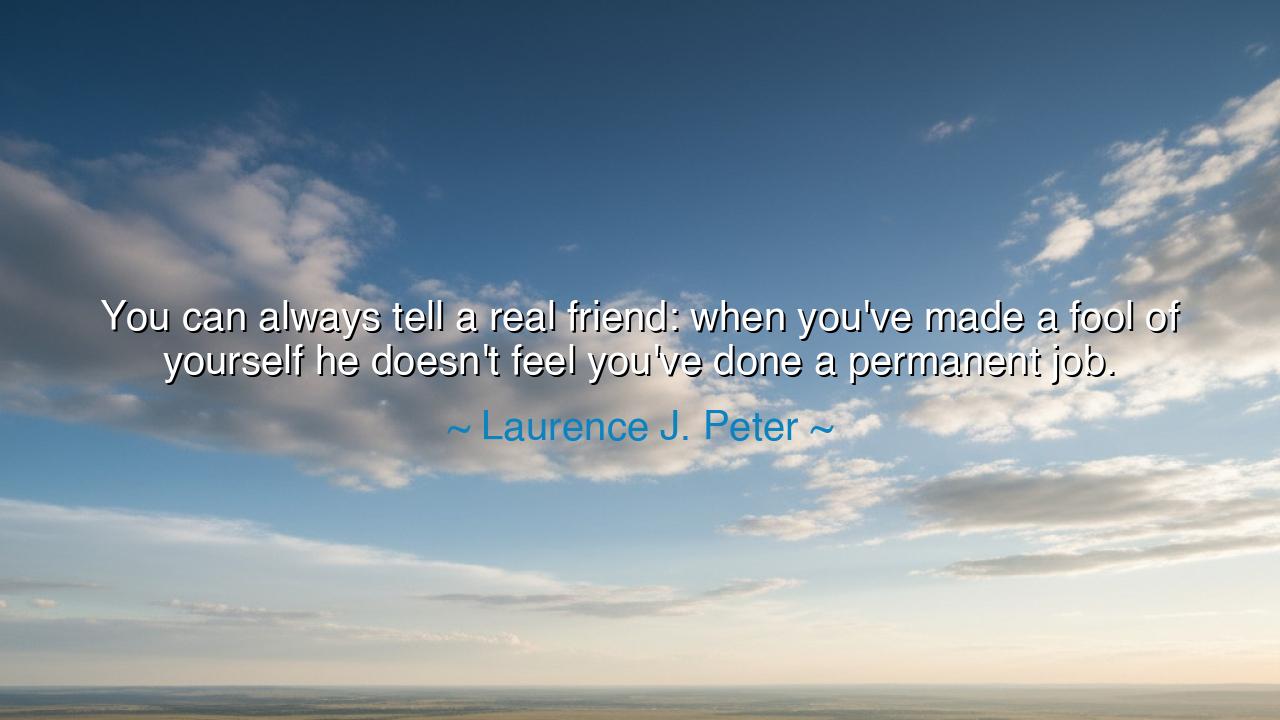
You can always tell a real friend: when you've made a fool of
You can always tell a real friend: when you've made a fool of yourself he doesn't feel you've done a permanent job.






The words, “You can always tell a real friend: when you’ve made a fool of yourself he doesn’t feel you’ve done a permanent job,” come from the wise humorist and educator Laurence J. Peter, whose insight into human nature was as gentle as it was profound. Though wrapped in wit, this saying hides within it a pearl of ancient truth: that a true friend sees your mistakes as passing shadows, not as your defining shape. In a world quick to judge and slow to forgive, Peter’s words remind us that the heart of friendship is mercy—the divine art of seeing the soul, not the stumble.
To make a fool of oneself is part of being human. The proud may deny it, the cautious may fear it, but none escape it. We speak too quickly, act too rashly, trust too much, and later we blush at our folly. Yet it is in such moments that the measure of friendship is revealed. The false friend laughs, mocks, or withdraws, treating your error as a stain that cannot be washed away. But the true friend, guided by understanding, sees beyond the blunder to the goodness that remains. He does not let one foolish act eclipse years of truth and kindness. To him, your mistake is not your identity—it is but a stone on the path of your becoming.
Consider the tale of Thomas Edison, the great inventor, whose experiments often ended in failure. One day, after an attempt to build a powerful battery exploded in smoke and ruin, an onlooker laughed and said, “You’ve failed again!” Edison’s assistant and close friend, Charles Batchelor, stood quietly beside him and replied, “He hasn’t failed. He’s found another way that won’t work.” That is real friendship—the kind that refuses to see a mistake as final, that refuses to label a momentary folly as a permanent flaw. Through patience and faith, Batchelor saw Edison not as a fool but as a soul in progress, and that loyalty became the soil in which genius continued to grow.
Such friendship is not blind; it does not ignore faults. Rather, it sees clearly and loves still. The real friend is the mirror that reflects not only who we are, but who we might yet become. He may laugh with us at our foolishness, but never against us. He may correct, but never condemn. For his loyalty is not rooted in pride but in compassion. To him, the bond between souls is far greater than the sum of their mistakes. This is the friendship of mercy, which is the truest kind of wisdom.
Those who love only when you are wise, graceful, or strong are not friends—they are admirers. Admirers stand close to light, but vanish when shadows fall. A true friend remains when laughter dies, when your pride is broken and your dignity bruised. He steadies you, not by words alone, but by presence—the silent assurance that your worth is unchanged. Such friendship is rare, for it demands a heart large enough to forgive and humble enough to remember that we, too, have made fools of ourselves in other hours.
Laurence J. Peter’s gentle humor conceals a truth that even philosophers have proclaimed: that understanding is the crown of love. To see another’s weakness without turning away—that is divine sight. Friendship endures not because we are flawless, but because we are accepted even when we falter. The real friend looks upon your folly and says, “You are better than this,” rather than, “You are this.” He restores your faith in yourself when the world has made you doubt it.
So, my child, learn this ancient wisdom: do not measure friendship by pleasure, but by forgiveness. Choose companions who laugh with kindness, not with cruelty; who stay when you fall, not only when you rise. And when your own friends stumble, be to them as the true friend is—gentle in judgment, fierce in loyalty, quick to forgive. For to love another despite their foolishness is to glimpse the patience of the heavens themselves.
In the end, Peter’s words are both a comfort and a calling. They tell us that to err is human—but to forgive, to remain, to see the best when the worst is shown, that is the mark of the real friend. Such a soul gives not only acceptance, but redemption. And when you find such a friend—or become one yourself—you will know the rarest joy under the sun: the peace of being loved, not for your perfection, but for your persistence to rise after every fall.






AAdministratorAdministrator
Welcome, honored guests. Please leave a comment, we will respond soon